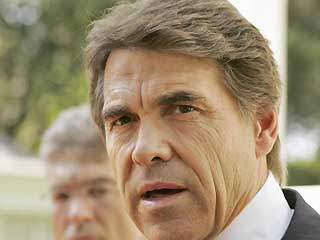Rick Perry, the Texas governor and possible Republican presidential hopeful, had back surgery recently that was credited as part of the reason why he has delayed a decision to enter the race to potentially take on pro-abortion President Barack Obama.
 The July 1 surgery was, as he called it on Twitter, a “little procedure” designed to treat a recurring injury. He said the spinal fusion and nerve decompression had gone “as advertised.”
The July 1 surgery was, as he called it on Twitter, a “little procedure” designed to treat a recurring injury. He said the spinal fusion and nerve decompression had gone “as advertised.”
However, the Texas Tribune, in a new article today on the procedure, says it involved the use of Perry’s own adult stem cells. Perry is a strong supporter of adult stem cell research as is the pro-life community, and he has promoted it as the more ethical and effective alternative to embryonic stem cell research because it is helping patients now without any of the moral concerns that accompany the embryonic variety.
The Tribune reported that Perry underwent an experimental injection of his own stem cells in a treatment that is not yet approved by the FDA because if its experimental component. The news web site said, “His treatment involved removing his own adult stem cells from healthy tissue and injecting them back into his body at the time of surgery, with the belief that the cells would assist tissue regeneration and speed recovery.”
Perry spokesman Mark Miner said yesterday that the procedure was “successful” and he confirmed it involved “the innovative use of his own adult stem cells.”
David Prentice, a former Indiana State University biology professor who is an expert on stem cell research, reacted to the news about Perry’s surgery in comments to LifeNews.com.
“It’s encouraging that Gov. Perry would make public his treatment with his own adult stem cells. Adult stem cells are improving health and saving lives for thousands of people every year. We wish Gov. Perry well and swift healing, and hope that this provides an opportunity for people to learn more about the success of ethical adult stem cells,” he said.
In his last race for governor, Perry and Sen. Kay Bailey Hutchison clashed on the issue of embryonic stem cell research as Hutchison bashed Perry for not putting in place a plan to aggressively pursue state taxpayer funding for embryonic stem cell research. But Robert Black, a spokesman for Governor Perry, who is pro-life, told the Associated Press at the time that Perry would launch a stem cell research initiative “that will give Texas a significant competitive advantage in the emerging technologies field, and that includes biomedical technology.”
However, Black cautioned that it would not promote embryonic stem cell research that Hutchison supports.
“Unlike Senator Hutchison, who supports embryonic stem cell research, Governor Perry supports President Bush’s position that we must strike a balance between science and the protection of life,” Black said.
President Bush put forward a stem cell research policy in August 2001 that prohibits using taxpayer funds to pay for new embryonic stem cell research that involves the destruction of human life. Instead, Bush authorized more than $190 million on funding adult stem cells, which are more ethical and have already produced more than 120 treatments for diseases and ailments.
Joe Pojman of the Texas Alliance for Life said during the squabble that Perry’s was the pro-life stance because he opposed embryonic stem cell research. “Governor Perry’s record on protecting innocent human life from abortion and cloning has been stellar,” he told LifeNews.
Perry eventually put together the Emerging Technology Fund, which awarded a $5 million grant to the Texas A&M and a $2.5 million grant to America Stem Cell for adult stem cell technologies. The Tribune also indicates that Perry recently wrote a letter to the Texas Medical Board, which is considering adopting rules related to stem cell research, saying he wants Texas to “become the world’s leader in the research and use of adult stem cells” and asked members of the board to “recognize the revolutionary potential that adult stem cell research and therapies have on our nation’s health, quality of life and economy.”







